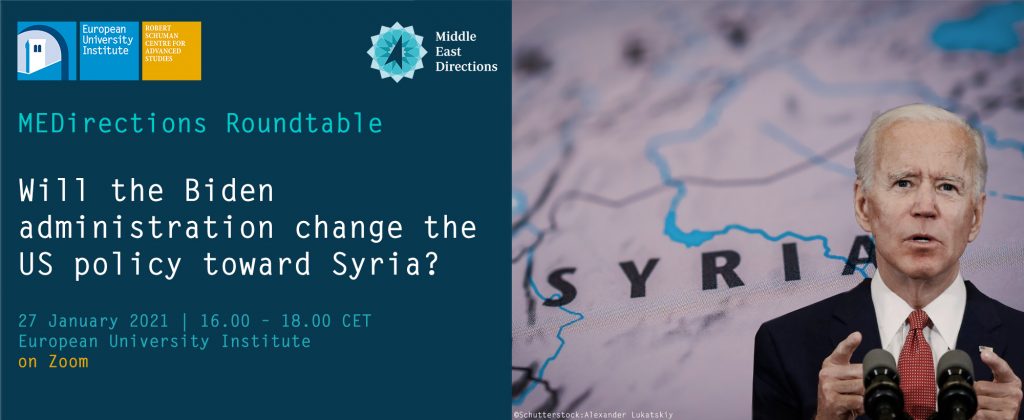
Both MENA regimes and opposition groups are closely following the formation of the new US administration, in particular the names of those who will be in charge of Middle Eastern files, in order to figure out the directions of US policy on the region. This is the case of Syria, where political crises and military confrontations have been shaking the country since the eruption of the Syrian uprising in March 2011.
This roundtable seeks to investigate what we can expect from the Biden administration regarding Syria by answering a number of questions.
What is the new administration’s approach to specific issues such as the US military presence in the northeast, sanctions and the presidential election in 2021? How will the new administration’s relations with Iran, Turkey and Russia shape its priorities in Syria? On its side, what does Syrian civil society expect from the new administration? How are the various civil society and humanitarian organizations planning to lobby for their causes in Washington? What lessons have they learned from working with the Obama and Trump administrations? What opportunities are there for more diplomatic cooperation between Europe and the US on the Syrian crisis?
Speakers
Ambassador Robert S. Ford (retired) is a scholar at the Middle East Institute in Washington, DC and a fellow Yale University’s Jackson Institute for Global Affairs where he teaches about U.S. foreign policy. Ford was the U.S. Ambassador to Syria from 2011 to 2014, the Political Affairs Chief and Deputy Ambassador at the U.S. Embassy in Baghdad 2008 – 2010 and the U.S. Ambassador in Algeria 2006 – 2008. He also served in Bahrain, Cameroon, Egypt, Turkey and Washington.
Joseph Bahout is director of the Issam Fares Institute for Public Policy and International Affairs at the American University of Beirut. His research focuses on political developments in Lebanon and Syria, regional spillover from the Syrian crisis and identity politics across the region.
Mutasem Syoufi is executive director of The Day After (TDA) organisation. Before joining TDA, Syoufi worked as political advisor to the Syrian Opposition Coalition (SOC) presidency. He has been involved in high-level negotiations and talks with various Syrian stakeholders and international officials and institutions.
Moderator
Agnes Favier is a part-time professor at the Middle East Directions Programme of the Robert Schuman Centre for Advanced Studies. She leads the Syria Initiative and is the project director of the Wartime and Post-Conflict in Syria (WPCS) project. Favier is a political scientist who specializes in comparative politics and conflicts in the Middle East with a particular focus on Lebanon and Syria.
Everyone is welcome.



